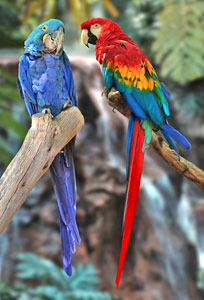
Wild macaws may subsist on seeds and nuts, but most veterinarians and animal experts agree that domesticated birds should be given a specially formulated pellet mix instead.
Nuts contain a high level of fat, and though wild animals may instinctively know what food they require, and forage for what they need on a day to day basis, pets are dependent on humans for giving them everything—and we may not be able to gauge their diet accurately. Pellet mixes have been scientifically measured to provide a nutritious and balanced serving of all the vitamins and minerals they need.
Pellets can be complemented with fresh fruits and vegetables. The amount depends on the macaw variety and the amount of exercise it gets a day. Some will need half a cup of pellets and half a cup of fresh fruits, others will need more.
You can feed macaws apples (remove the seeds, which can make parrots sick), pears, cherries, bananas, mangoes, papayas, strawberries and blueberries, oranges, plums, and cherries. Don’t give avocados, which are toxic to birds. It’s also advisable to buy organic food, since the pesticides and chemical fertilizers can be toxic to birds.
Offer limited servings of macadamias, almonds and walnuts a day. In fact, it’s best to consider these as treats, given as a reward for a successful trick, or as a special dessert at the end of the day.
Some macaws may initially refuse pellet mixes. Don’t give up. Introduce the pellets gradually. For two weeks, mix pellets with seeds, just to give the birds a chance to get used to the sight and smell. Then, gradually decrease the amount of seeds while giving unlimited access to pellets and vegetables. Don’t worry, you’re not depriving your pets—they’ll be healthier because of your efforts!
Always keep pellets, fresh fruits and vegetables, and water in separate feeding dishes. Pellets don’t spoil easily, unless they become damp. However, many greens and fruits have natural moisture.
Wash the dishes for water and the fruits and vegetables every day. Wash the dish for pellets every three days before filling with a fresh batch.
Many owners recommend having two sets of dishes, since cleaning is more convenient.
Be sure to provide a cuttle bone and mineral block, too. These supplements are usually hung at the side of the cage, so the bird can peck at it during the day. Your veterinarian may also recommend liquid vitamins that you can mix into the pellets.